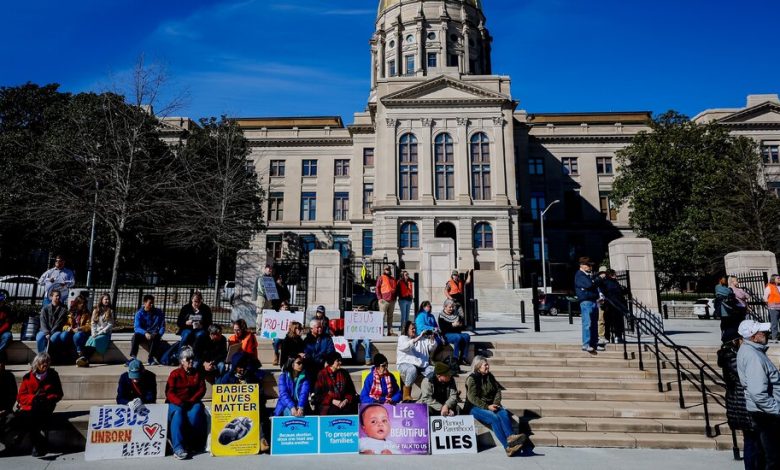Georgia Supreme Court Allows State’s Six-Week Abortion Ban to Remain in Effect

Georgia’s Supreme Court upheld the state’s prohibition of abortion Tuesday, rejecting arguments made by doctors and advocacy groups that the law was unconstitutional when the state legislature approved it in 2019, more than three years before the U.S. Supreme Court overturned Roe v. Wade.
The ruling means that abortion remains banned in the state, with limited exceptions, after the sixth week of pregnancy — a point when most women have not yet even realized they are pregnant. With North Carolina now banning most abortions after 12 weeks of pregnancy, South Carolina after six weeks, and Florida doing the same, pending a legal challenge, the ruling ensures that abortion will be largely inaccessible in the Deep South, forcing women there to travel farther for care, to more distant states like Virginia or Illinois.
The Georgia case is not over, because the court addressed only the question of whether the state ban should have been voided because of when it was enacted. The court sent the case back to a lower court for a trial on the separate question of whether the state constitution protects a right to privacy, and whether that right encompasses abortion.
Still, the latest ruling in Georgia is a reminder that state constitutions have become key arbiters in the nation’s state-by-state abortion battles.
In its 6-1 decision, with one justice disqualified and another not participating, the Georgia Supreme Court leaned heavily on the U.S. Supreme Court’s Dobbs decision, which overturned a national right to abortion, in reviewing Georgia’s law, the Living Infants and Equality Act, known as the LIFE Act.
“Because Dobbs is controlling precedent on whether the United States Constitution confers a right to abortion, and because the parties and the trial court do not dispute that the LIFE Act complies with Dobbs, it follows that the LIFE Act did not violate the United States Constitution when enacted in 2019,” the state court concluded.
On Tuesday morning, after the court issued its ruling, Chris Carr, the attorney general of Georgia, said in a statement, “We are pleased with the court’s decision and will continue to defend the constitutionality of Georgia’s LIFE Act.”
When the Dobbs decision revoked the federal constitutional right to abortion in 2022, it kicked the question of abortion to the states to regulate. Since then, many of them have enacted abortion bans, and many lawsuits have been filed to challenge the bans, with abortion rights lawyers arguing that the prohibitions are unconstitutional under state guarantees of privacy, health, liberty or family planning.
One of the most closely watched cases involves Florida, where the state Supreme Court heard oral arguments in September challenging that state’s 15-week ban.
Other states’ supreme courts that have ruled already this year have split on the issue: North Dakota and Oklahoma found that their state constitutions protected the right in some situations. But Idaho ruled that its Constitution did not protect abortion, and courts in South Carolina and Indiana upheld abortion bans passed since Dobbs.
The Georgia case, which was brought by the SisterSong Women of Color Reproductive Justice Collective, focused on a doctrine of state law known as void ab initio, meaning void from the beginning. That doctrine says, in essence, that a Georgia law that violates the state or federal constitution at the time it is enacted is forever unconstitutional, said Julia Kaye, a senior staff attorney with the A.C.L.U. Reproductive Freedom Product, the lead attorney for abortion providers in the case.
The plaintiffs had prevailed in November at a lower level, when Judge Robert C.I. McBurney of Fulton County Superior Court ruled that the six-week ban was enacted when “everywhere in America, including Georgia, it was unequivocally unconstitutional for governments — federal, state, or local — to ban abortions before viability.”
But one week later, the state Supreme Court temporarily reinstated the six-week ban, setting the stage for Tuesday’s ruling.
During oral arguments in March, the justices had seemed receptive to the arguments made by Stephen Petrany, the state’s solicitor general, that the Dobbs decision applied retroactively and that Roe v. Wade was incorrect all along.
By contrast, the Georgia justices had seemed skeptical of the arguments made by Julia Blackburn Stone, a lawyer for the plaintiffs.
“Dobbs expressly says the prior precedent was wrong,” said Justice Charles J. Bethel.
In a statement underscoring the political impact of the issue, Julia Chavez Rodriguez, the campaign manager for the Biden-Harris re-election campaign, noted calls by some Republicans for a national abortion ban and said, “The stakes couldn’t be higher: This election could determine whether every woman in America faces the same terrifying reality Georgians will now face.”
Marjorie Dannenfelser, the president of Susan B. Anthony Pro-Life America, congratulated and thanked Gov. Brian Kemp of Georgia and other allies who pushed for the six-week ban. She said in a statement that 25 states now “have pro-life protections in their law in the new Dobbs era.”
“When you lead and stand boldly for life, Americans will stand with you,” she said.



